- Home
- Jr. Horatio Alger
Paul Prescott's Charge Page 15
Paul Prescott's Charge Read online
Page 15
XV.
A TURN OF FORTUNE.
Notwithstanding his singular bedchamber, Paul had a refreshing night'ssleep from which he did not awake till the sun had fairly risen, and itsrays colored by the medium through which they were reflected, streamedin at the windows and rested in many fantastic lines on the richlycarved pulpit and luxurious pews.
Paul sprang to his feet and looked around him in bewilderment.
"Where am I?" he exclaimed in astonishment.
In the momentary confusion of ideas which is apt to follow a suddenawakening, he could not remember where he was, or how he chanced tobe there. But in a moment memory came to his aid, and he recalled theevents of the preceding day, and saw that he must have been locked up inthe church.
"How am I going to get out?" Paul asked himself in dismay.
This was the important question just now. He remembered that the villagemeeting-house which he had been accustomed to attend was rarely openedexcept on Sundays. What if this should be the case here? It was Thursdaymorning, and three days must elapse before his release. This would neverdo. He must seek some earlier mode of deliverance.
He went first to the windows, but found them so secured that it wasimpossible for him to get them open. He tried the doors, but found, ashe had anticipated, that they were fast. His last resource failing, hewas at liberty to follow the dictates of his curiosity.
Finding a small door partly open, he peeped within, and found a flightof steep stairs rising before him. They wound round and round, andseemed almost interminable. At length, after he had become almost wearyof ascending, he came to a small window, out of which he looked. At hisfeet lay the numberless roofs of the city, while not far away his eyerested on thousands of masts. The river sparkled in the sun, and Paul,in spite of his concern, could not help enjoying the scene. The soundof horses and carriages moving along the great thoroughfare below cameconfusedly to his ears. He leaned forward to look down, but the distancewas so much greater than he had thought, that he drew back in alarm.
"What shall I do?" Paul asked himself, rather frightened. "I wonder if Ican stand going without food for three days? I suppose nobody would hearme if I should scream as loud as I could."
Paul shouted, but there was so much noise in the streets that nobodyprobably heard him.
He descended the staircase, and once more found himself in the bodyof the church. He went up into the pulpit, but there seemed no hope ofescape in that direction. There was a door leading out on one side, butthis only led to a little room into which the minister retired beforeservice.
It seemed rather odd to Paul to find himself the sole occupant of solarge a building. He began to wonder whether it would not have beenbetter for him to stay in the poorhouse, than come to New York to die ofstarvation.
Just at this moment Paul heard a key rattle in the outer door. Filledwith new hope, he ran down the pulpit stairs and out into the porch,just in time to see the entrance of the sexton.
The sexton started in surprise as his eye fell upon Paul standing beforehim, with his bundle under his arm.
"Where did you come from, and how came you here?" he asked with somesuspicion.
"I came in last night, and fell asleep."
"So you passed the night here?"
"Yes, sir."
"What made you come in at all?" inquired the sexton, who knew enough ofboys to be curious upon this point.
"I didn't know where else to go," said Paul.
"Where do you live?"
Paul answered with perfect truth, "I don't live anywhere."
"What! Have you no home?" asked the sexton in surprise.
Paul shook his head.
"Where should you have slept if you hadn't come in here?"
"I don't know, I'm sure."
"And I suppose you don't know where you shall sleep to-night?"
Paul signified that he did not.
"I knew there were plenty of such cases," said the sexton, meditatively;"but I never seemed to realize it before."
"How long have you been in New York?" was his next inquiry.
"Not very long," said Paul. "I only got here yesterday."
"Then you don't know anybody in the city?"
"No."
"Why did you come here, then?"
"Because I wanted to go somewhere where I could earn a living, and Ithought I might find something to do here."
"But suppose you shouldn't find anything to do?"
"I don't know," said Paul, slowly. "I haven't thought much about that."
"Well, my lad," said the sexton, not unkindly, "I can't say yourprospects look very bright. You should have good reasons for entering onsuch an undertaking. I--I don't think you are a bad boy. You don't looklike a bad one," he added, half to himself.
"I hope not, sir," said Paul.
"I hope not, too. I was going to say that I wish I could help you tosome kind of work. If you will come home with me, you shall be welcometo a dinner, and perhaps I may be able to think of something for you."
Paul gladly prepared to follow his new acquaintance.
"What is your name?" inquired the sexton.
"Paul Prescott."
"That sounds like a good name. I suppose you haven't got much money?"
"Only twelve cents."
"Bless me! only twelve cents. Poor boy! you are indeed poor."
"But I can work," said Paul, spiritedly. "I ought to be able to earn myliving."
"Yes, yes, that's the way to feel. Heaven helps those who helpthemselves."
When they were fairly out of the church, Paul had an opportunity ofobserving his companion's external appearance. He was an elderly man,with harsh features, which would have been forbidding, but for a certainair of benevolence which softened their expression.
As Paul walked along, he related, with less of detail, the story whichis already known to the reader. The sexton said little except in theway of questions designed to elicit further particulars, till, at theconclusion he said, "Must tell Hester."
At length they came to a small house, in a respectable but notfashionable quarter of the city. One-half of this was occupied by thesexton. He opened the door and led the way into the sitting-room. Itwas plainly but neatly furnished, the only ornament being one or twoengravings cheaply framed and hung over the mantel-piece. They wereby no means gems of art, but then, the sexton did not claim to be aconnoisseur, and would probably not have understood the meaning of theword.
"Sit here a moment," said the sexton, pointing to a chair, "I'll go andspeak to Hester."
Paul whiled away the time in looking at the pictures in a copy of "ThePilgrim's Progress," which lay on the table.
In the next room sat a woman of perhaps fifty engaged in knitting. Itwas very easy to see that she could never have possessed the perishablegift of beauty. Hers was one of the faces on which nature has writtenPLAIN, in unmistakable characters. Yet if the outward features had beena reflex of the soul within, few faces would have been more attractivethan that of Hester Cameron. At the feet of the sexton's wife, for suchshe was, reposed a maltese cat, purring softly by way of showing hercontentment. Indeed, she had good reason to be satisfied. In default ofchildren, puss had become a privileged pet, being well fed and carefullyshielded from all the perils that beset cat-hood.
"Home so soon?" said Hester inquiringly, as her husband opened the door.
"Yes, Hester, and I have brought company with me," said the sexton.
"Company!" repeated his wife. "Who is it?"
"It is a poor boy, who was accidentally locked up in the church lastnight."
"And he had to stay there all night?"
"Yes; but perhaps it was lucky for him, for he had no other place tosleep, and not money enough to pay for one."
"Poor child!" said Hester, compassionately. "Is it not terrible to thinkthat any human creature should be without the comforts of a home whicheven our tabby possesses. It ought to make you thankful that you are sowell cared for, Tab."
Th
e cat opened her eyes and winked drowsily at her mistress.
"So you brought the poor boy home, Hugh?"
"Yes, Hester,--I thought we ought not to begrudge a meal to one lessfavored by fortune than ourselves. You know we should consider ourselvesthe almoners of God's bounties."
"Surely, Hugh."
"I knew you would feel so, Hester. And suppose we have the chicken fordinner that I sent in the morning. I begin to have a famous appetite. Ithink I should enjoy it."
Hester knew perfectly well that it was for Paul's sake, and not for hisown, that her husband spoke. But she so far entered into his feelings,that she determined to expend her utmost skill as cook upon the dinner,that Paul might have at least one good meal.
"Now I will bring the boy in," said he. "I am obliged to go to work, butyou will find some way to entertain him, I dare say."
"If you will come out (this he said to Paul), I will introduce you to anew friend."
Paul was kindly welcomed by the sexton's wife, who questioned him ina sympathizing tone about his enforced stay in the church. To all herquestions Paul answered in a modest yet manly fashion, so as to producea decidedly favorable impression upon his entertainer.
Our hero was a handsome boy. Just at present he was somewhat thin, nothaving entirely recovered from the effects of his sickness and poor farewhile a member of Mr. Mudge's family; but he was well made, and badefair to become a stout boy. His manner was free and unembarrassed, andhe carried a letter of recommendation in his face. It must be admitted,however that there were two points in which his appearance might havebeen improved. Both his hands and face had suffered from the dust oftravel. His clothes, too, were full of dust.
A single glance told Hester all this, and she resolved to remedy it.
She quietly got some water and a towel, and requested Paul to pull offhis jacket, which she dusted while he was performing his ablutions.Then, with the help of a comb to arrange his disordered hair, he seemedquite like a new boy, and felt quite refreshed by the operation.
"Really, it improves him very much," said Hester to herself.
She couldn't help recalling a boy of her own,--the only child she everhad,--who had been accidentally drowned when about the age of Paul.
"If he had only lived," she thought, "how different might have been ourlives."
A thought came into her mind, and she looked earnestly at Paul.
"I--yes I will speak to Hugh about it," she said, speaking aloud,unconsciously.
"Did you speak to me?" asked Paul.
"No,--I was thinking of something."
She observed that Paul was looking rather wistfully at a loaf of breadon the table.
"Don't you feel hungry?" she asked, kindly.
"I dare say you have had no breakfast."
"I have eaten nothing since yesterday afternoon."
"Bless my soul! How hungry you must be!" said the good woman, as shebustled about to get a plate of butter and a knife.
She must have been convinced of it by the rapid manner in which theslices of bread and butter disappeared.
At one o'clock the sexton came home. Dinner was laid, and Paul partookof it with an appetite little affected by his lunch of the morning. Ashe rose from the table, he took his cap, and saying, "Good-by, I thankyou very much for your kindness!" he was about to depart.
"Where are you going?" asked the sexton, in surprise.
"I don't know," answered Paul.
"Stop a minute. Hester, I want to speak to you."
They went into the sitting-room together.
"This boy, Hester," he commenced with hesitation.
"Well, Hugh?"
"He has no home."
"It is a hard lot."
"Do you think we should be the worse off if we offered to share our homewith him?"
"It is like your kind heart, Hugh. Let us go and tell him."
"We have been talking of you, Paul," said the sexton. "We have thought,Hester and myself, that as you had no home and we no child, we shouldall be the gainers by your staying with us. Do you consent?"
"Consent!" echoed Paul in joyful surprise. "How can I ever repay yourkindness?"
"If you are the boy we take you for, we shall feel abundantly repaid.Hester, we can give Paul the little bedroom where--where John used tosleep."
His voice faltered a little, for John was the name of his boy, who hadbeen drowned.

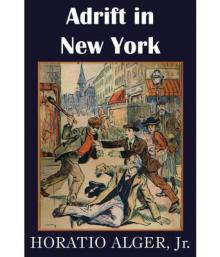 Adrift in New York: Tom and Florence Braving the World
Adrift in New York: Tom and Florence Braving the World Do and Dare — a Brave Boy's Fight for Fortune
Do and Dare — a Brave Boy's Fight for Fortune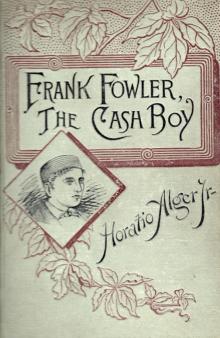 The Cash Boy
The Cash Boy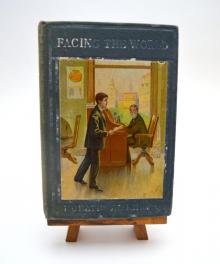 Facing the World
Facing the World The Young Explorer; Or, Claiming His Fortune
The Young Explorer; Or, Claiming His Fortune The Store Boy
The Store Boy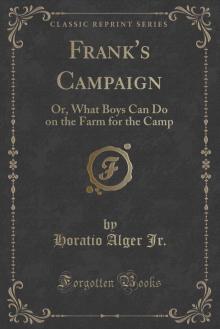 Frank's Campaign; Or, The Farm and the Camp
Frank's Campaign; Or, The Farm and the Camp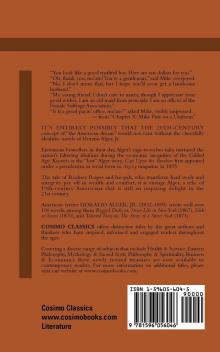 Cast Upon the Breakers
Cast Upon the Breakers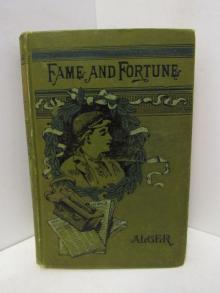 Fame and Fortune; or, The Progress of Richard Hunter
Fame and Fortune; or, The Progress of Richard Hunter The Errand Boy; Or, How Phil Brent Won Success
The Errand Boy; Or, How Phil Brent Won Success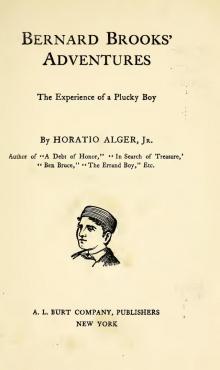 Bernard Brooks' Adventures: The Experience of a Plucky Boy
Bernard Brooks' Adventures: The Experience of a Plucky Boy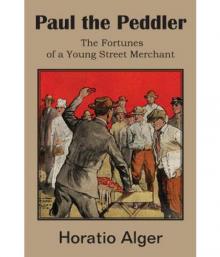 Paul the Peddler; Or, The Fortunes of a Young Street Merchant
Paul the Peddler; Or, The Fortunes of a Young Street Merchant Brave and Bold; Or, The Fortunes of Robert Rushton
Brave and Bold; Or, The Fortunes of Robert Rushton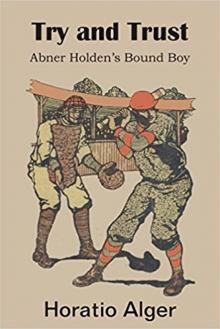 Try and Trust; Or, Abner Holden's Bound Boy
Try and Trust; Or, Abner Holden's Bound Boy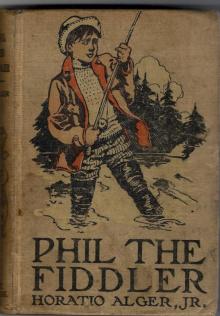 Phil, the Fiddler
Phil, the Fiddler In A New World; or, Among The Gold Fields Of Australia
In A New World; or, Among The Gold Fields Of Australia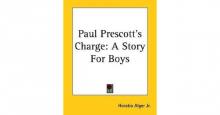 Paul Prescott's Charge
Paul Prescott's Charge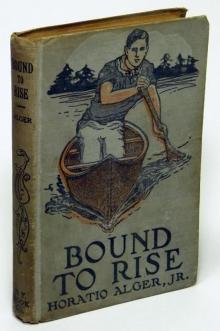 Joe's Luck; Or, Always Wide Awake
Joe's Luck; Or, Always Wide Awake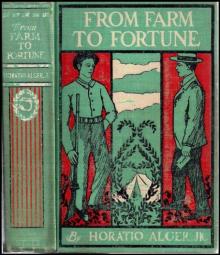 From Farm to Fortune; or, Nat Nason's Strange Experience
From Farm to Fortune; or, Nat Nason's Strange Experience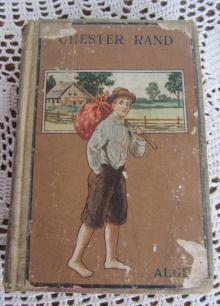 Chester Rand; or, The New Path to Fortune
Chester Rand; or, The New Path to Fortune Driven from Home; Or, Carl Crawford's Experience
Driven from Home; Or, Carl Crawford's Experience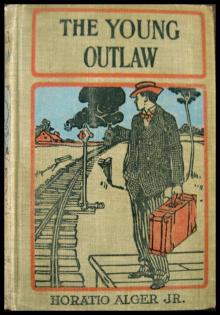 The Young Outlaw; or, Adrift in the Streets
The Young Outlaw; or, Adrift in the Streets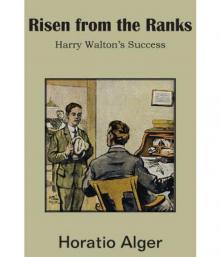 Risen from the Ranks; Or, Harry Walton's Success
Risen from the Ranks; Or, Harry Walton's Success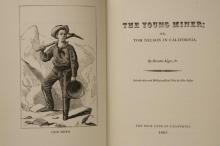 The Young Miner; Or, Tom Nelson in California
The Young Miner; Or, Tom Nelson in California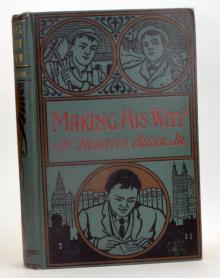 Making His Way; Or, Frank Courtney's Struggle Upward
Making His Way; Or, Frank Courtney's Struggle Upward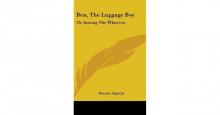 Ben, the Luggage Boy; Or, Among the Wharves
Ben, the Luggage Boy; Or, Among the Wharves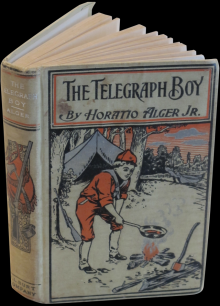 The Telegraph Boy
The Telegraph Boy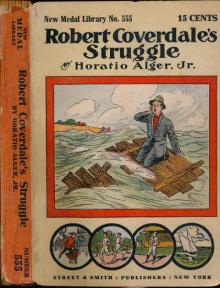 Robert Coverdale's Struggle; Or, on the Wave of Success
Robert Coverdale's Struggle; Or, on the Wave of Success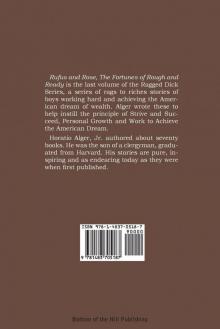 Rufus and Rose; Or, The Fortunes of Rough and Ready
Rufus and Rose; Or, The Fortunes of Rough and Ready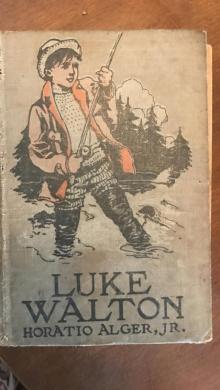 Luke Walton
Luke Walton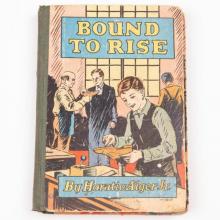 Mark Mason's Victory: The Trials and Triumphs of a Telegraph Boy
Mark Mason's Victory: The Trials and Triumphs of a Telegraph Boy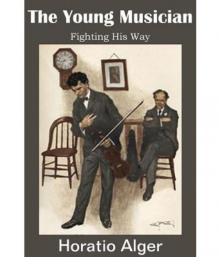 The Young Musician; Or, Fighting His Way
The Young Musician; Or, Fighting His Way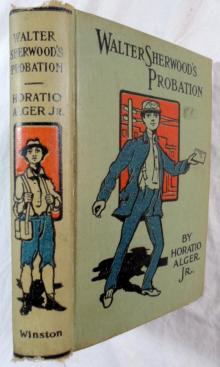 Walter Sherwood's Probation
Walter Sherwood's Probation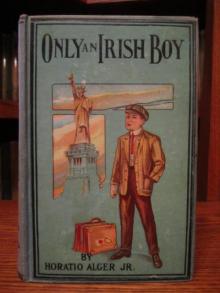 Only an Irish Boy; Or, Andy Burke's Fortunes
Only an Irish Boy; Or, Andy Burke's Fortunes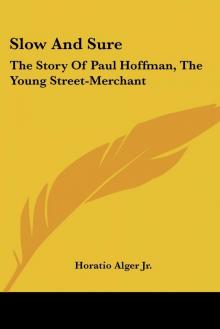 Slow and Sure: The Story of Paul Hoffman the Young Street-Merchant
Slow and Sure: The Story of Paul Hoffman the Young Street-Merchant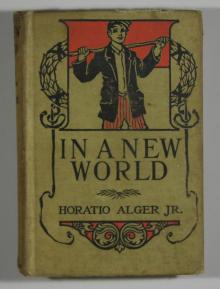 Herbert Carter's Legacy; Or, the Inventor's Son
Herbert Carter's Legacy; Or, the Inventor's Son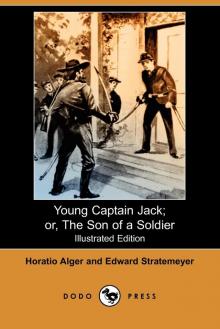 Young Captain Jack; Or, The Son of a Soldier
Young Captain Jack; Or, The Son of a Soldier Timothy Crump's Ward: A Story of American Life
Timothy Crump's Ward: A Story of American Life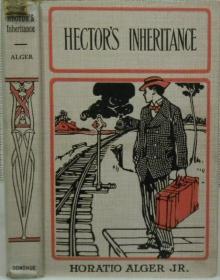 Hector's Inheritance, Or, the Boys of Smith Institute
Hector's Inheritance, Or, the Boys of Smith Institute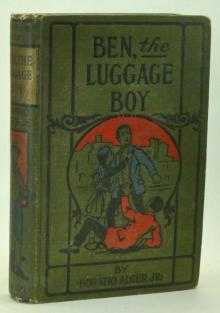 Ben's Nugget; Or, A Boy's Search For Fortune
Ben's Nugget; Or, A Boy's Search For Fortune